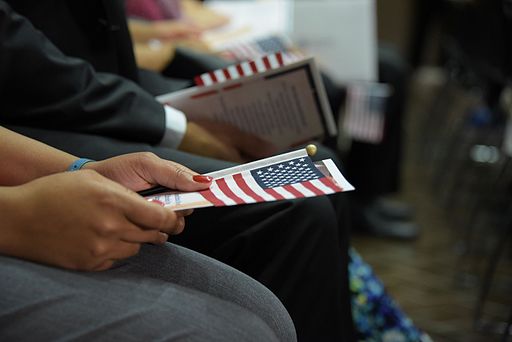Should States Make the U.S. Citizenship Test a Graduation Requirement?
by Shawn Healy, PhD, Civic Learning Scholar
This was the question posed to me by Congressional Quarterly last fall in a call to draft an opinion-editorial in opposition to emerging state policies transforming the U.S. citizenship test into a high-stakes graduation requirement (check out their larger, in-depth report on civic education).

The Joe Foss Institute has been successful in pushing policies of this ilk in 15 states and counting with a 50-state strategy in the works (click here to read the case for requiring the citizenship test). As I argue in my piece excerpted below, the marginalization of civic learning is certainly cause for national concern, but this solution is overly simplistic and may further undermine students’ civic development.
The Joe Foss Institute of Arizona has rightly focused its attention on the marginalization of civic learning in K-12 education throughout the United States. However, its solution — requiring high school students to pass the U.S. citizenship test before graduation — isn't the answer to fostering the knowledge, skills, attitudes and behaviors among young people necessary for informed engagement in our democracy.
The test itself wasn't designed as a summative assessment for students. While many of the questions and answers constitute important factual knowledge that I would hope we all possess as Americans, some of them border on trivia. My fear is that a citizenship test will serve as more of a ceiling than a floor for civic learning in the United States.
Based on my analysis of the results of the last three iterations of the National Assessment of Educational Progress in Civics (1998, 2006 and 2010), instruction in the form of textbook reading, memorization of material and worksheet completion too often constitutes the sum of students' civic learning experience.
Moreover, I tested the link between teaching specific content knowledge, such as the U.S. Constitution or Congress, and student performance by measuring civic knowledge and skills. I found no relationship between these variables.
Instead, students did best when discussing current events in class daily, simulating democratic processes regularly and engaging in community service annually. These practices are too often neglected in content-centered courses, and students depart with a fleeting knowledge base and are poorly prepared for the demands of democratic governance.
Student-centered civic learning practices should lie at the heart of policy efforts to improve youths' civic knowledge. For example, Illinois recently passed a law requiring schools to offer a semester-long course that embeds these practices through discussion, service-learning and simulations.
Assessment is also imperative, and Tennessee opted for a project-based learning requirement in civics, where students demonstrate their civic capacity by doing, the heart of democratic governance.
Instead of a shallow exercise in memorization, let's unite around course requirements, standards and assessments that empower students not only with knowledge, but also skills, attitudes and behaviors requisite for lifelong civic engagement.
The test itself wasn't designed as a summative assessment for students. While many of the questions and answers constitute important factual knowledge that I would hope we all possess as Americans, some of them border on trivia. My fear is that a citizenship test will serve as more of a ceiling than a floor for civic learning in the United States.
Based on my analysis of the results of the last three iterations of the National Assessment of Educational Progress in Civics (1998, 2006 and 2010), instruction in the form of textbook reading, memorization of material and worksheet completion too often constitutes the sum of students' civic learning experience.
Moreover, I tested the link between teaching specific content knowledge, such as the U.S. Constitution or Congress, and student performance by measuring civic knowledge and skills. I found no relationship between these variables.
Instead, students did best when discussing current events in class daily, simulating democratic processes regularly and engaging in community service annually. These practices are too often neglected in content-centered courses, and students depart with a fleeting knowledge base and are poorly prepared for the demands of democratic governance.
Student-centered civic learning practices should lie at the heart of policy efforts to improve youths' civic knowledge. For example, Illinois recently passed a law requiring schools to offer a semester-long course that embeds these practices through discussion, service-learning and simulations.
Assessment is also imperative, and Tennessee opted for a project-based learning requirement in civics, where students demonstrate their civic capacity by doing, the heart of democratic governance.
Instead of a shallow exercise in memorization, let's unite around course requirements, standards and assessments that empower students not only with knowledge, but also skills, attitudes and behaviors requisite for lifelong civic engagement.




Good to read.
ReplyDelete